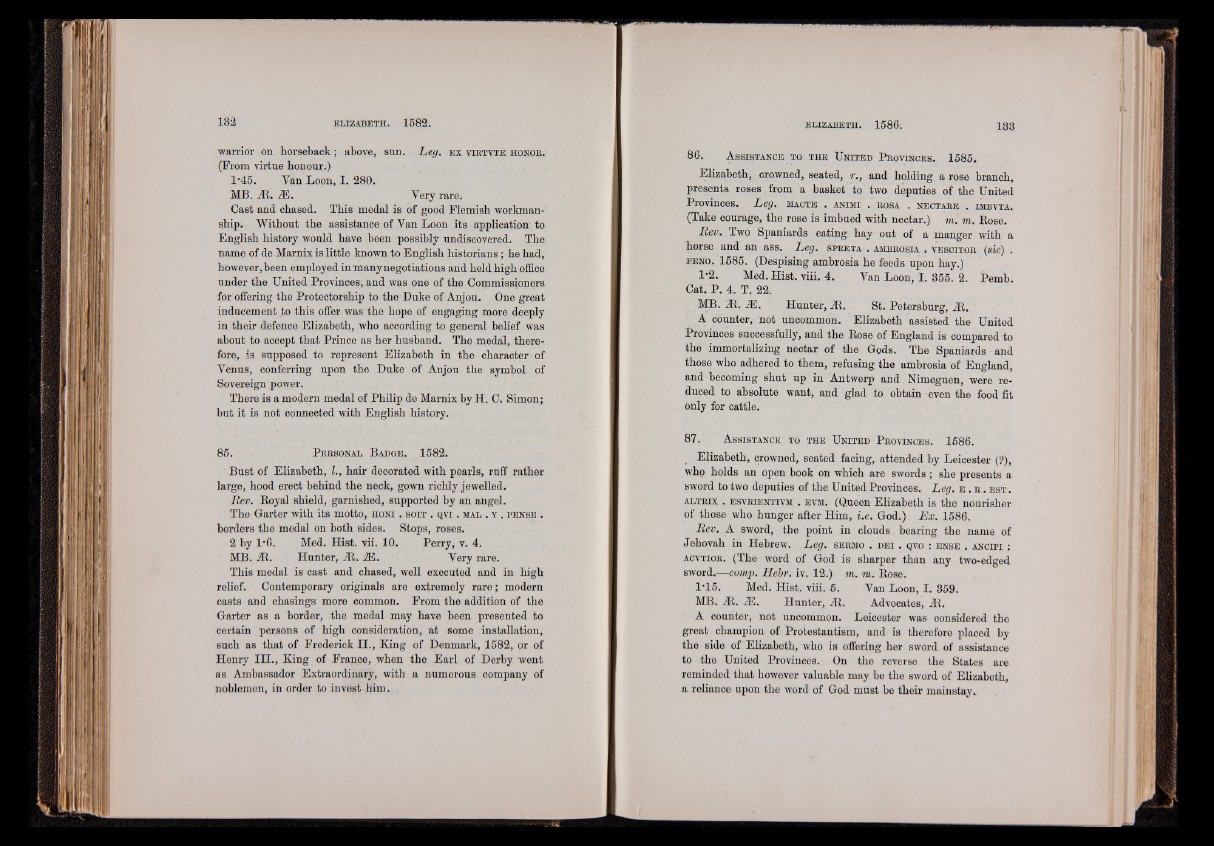
warrior on horseback; above, sun. Leg. e x v i r t v t e h o n o r . '
(From virtue honour.)
P45. Yan Loon, I. 280.
MB. At. AS. Very rare.
Cast and chased. This medal is of good Flemish workmanship.
Without the assistance of Van Loon its application to
English history would have been possibly undiscovered. The
name of de Marnix is little known to English historians; he had,
however, been employed in many negotiations and held high office
under the United Provinces, and was one of the Commissioners
for offering the Protectorship to the Duke of Anjou. One great
inducement to this offer was the hope of engaging more deeply
in their defence Elizabeth, who according to general belief was
about to accept that Prince as her husband. The medal, therefore,
is supposed to represent Elizabeth in the character of
Venus, conferring upon the Duke of Anjou the symbol of
Sovereign power.
There is a modern medal of Philip de Marnix by HI C. Simon;
but it is not connected with English history.
85. P e r s o n a l B a d g e . 1582,
Bust of Elizabeth, I., hair decorated with pearls, ruff rather
large, hood erect behind the neck, gown richly jewelled.
Rev. Royal shield, garnished, supported by an angel.
The Garter with its motto, h o n i . s o i t . q v i . m a l . v . p e n s e .
borders the medal on both sides. Stops, roses.
2 by P 6. Med. Hist. vii. 10. Perry, v. 4.
MB. jit. Hunter, At. AS. Very rare.
This medal is cast and chased, well executed and in high
relief. Contemporary originals are extremely rare; modern
casts and chasings more common. From the addition of the
Garter as a border, the medal may have been presented to
certain persons of high consideration, at some installation,
such as that of Frederick II., King of Denmark, 1582, or of
Henry III., King of France, when the Earl of Derby went
as Ambassador Extraordinary, with a numerous company of
noblemen, in order to invest him.
86. A s s i s t a n c e t o t h e U n i t e d P r o v i n c e s . 1585;
Elizabeth, crowned, seated, r., and holding a rose branch,
presents roses from a basket to two deputies of the United
Provinces. Leg. m a c t e . a n im i . b o s a . n e c t a r e . im b v ta .
(Take courage, the rose is imbued with nectar.) in. m. Rose.
Rev. Two Spaniards eating hay out of a manger with a
horse and an ass. Leg. s p r e t a - . a m b r o s i a ; v e s c i t o r (sic) .
e e n o . 1585. (Despising ambrosia he feeds upon hay.)
1*2. Med. Hist. viii. 4. Van Loon, I. 355. 2. Pemb.
Cat. P. 4. T, 22.
MB. At. AS. Hunter, At. St. Petersburg, At.
A counter, not uncommon. Elizabeth assisted the United
Provinces successfully, and the Rose of England is compared to
the immortalizing nectar of the Gods. The Spaniards ■ and
those who adhered to them, refusing the ambrosia of England,
and becoming shut up in Antwerp and Nimeguen, were reduced
to absolute want, and glad to obtain even the food fit
only for cattle.
87. A s s i s t a n c e t o t h e U n i t e d P r o v i n c e s . 1586.
Elizabeth, crowned, seated facing, attended by Leicester (?),
who holds an open book on which are swords ; she presents a
sword to two deputies of the United Provinces. Leg. e . r . e s t .
a l t r i x . e s v r i e n t i v m . e vm . (Queen Elizabeth is the nourisher
of those who hunger after Him, i.e. God.) Ex. 1586.
Rev. A sword, the point in clouds bearing the name of
Jehovah in Hebrew. Leg. s e rm o . d e i . q v o : e n s e . a n c ip i :
a c v t i o r . (The word of God is sharper than any two-edged
sword.—comp. Hebr. iv. 12 .) m. m. Rose.
1‘15. Med. Hist. viii. 5. Van Loon, I. 859.
MB. At. AS. Hunter, At. Advocates, At.
A counter, not uncommon. Leicester was considered the
great champion of Protestantism, and is therefore placed by
the side of Elizabeth, who is offering her sword of assistance
to the United Provinces. On the reverse the States are
reminded that however valuable may be the sword of Elizabeth,
a reliance upon the word of God must be their mainstay..